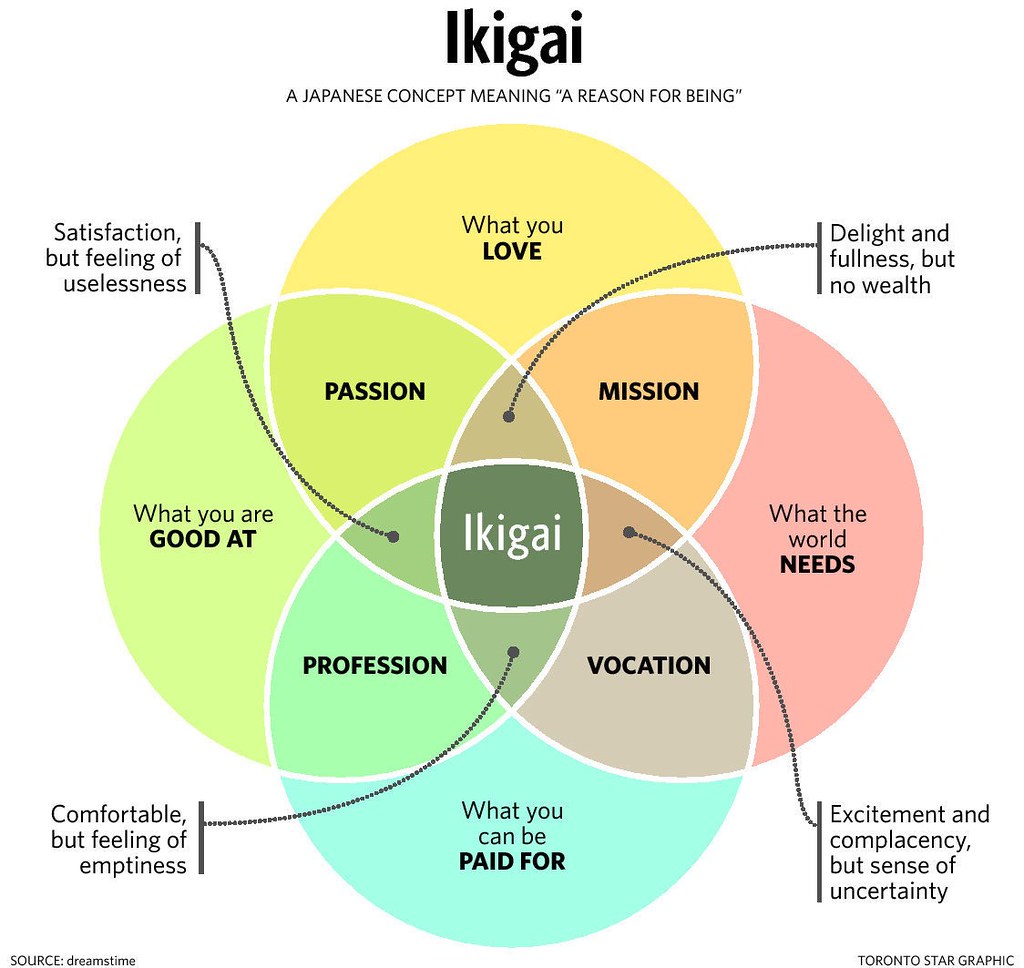IKIGAI as a Tool for Professional and Life Satisfaction

How can you find meaning in work and life? How can you wake up in the morning without thinking, “Oh no, it’s Monday again…” but instead look forward to a new day? You might have heard about work-life balance or the idea that work should also be a hobby. But reality is often different—sometimes work doesn’t excite us, other times we love what we do, but our wallet suffers. So how can we find balance between what we enjoy, what we’re good at, what the world needs, and what can sustain us financially?
A possible answer is IKIGAI—a Japanese philosophy that helps people live a happy, fulfilling, and long life. It’s not an instant recipe for happiness, but rather a way to organize your priorities and discover what truly gives you meaning. Whether you’re considering a career change, feeling stuck, or simply want to confirm that you’re on the right path, IKIGAI can help you find the answers.
What Is IKIGAI and How Does It Relate to Careers?
Imagine doing work that you love, that you’re great at, that helps others, and that provides you with a comfortable living. Sounds like a dream? That’s IKIGAI in action! But what if one of these components is missing? How does that impact your satisfaction and motivation?
Let’s break it down. IKIGAI is built on four pillars:
What you are good at – What you love – What the world needs – What you can be paid for
- What you are good at: Simply put, your skills. You don’t have to be the best in the world, but you should be good enough to grow and for others to recognize your talent.
- What you love: The things that bring you joy, things you’d do even for free (although, of course, you need to eat, so ideally not for free forever).
- What the world needs: Not every job has to save lives, but it should have some purpose and contribute to society in a meaningful way.
- What you can be paid for: You may love painting and be excellent at it, but if no one buys your artwork, it won’t pay the bills.
If we manage to connect all four components, we reach an ideal state where we feel fulfilled, happy, and secure in our work. However, many people struggle with this because they are missing one or more of these key elements.
A Real-Life Example of Finding IKIGAI
Singer Tomáš Klus claims he has found his IKIGAI and is riding the wave of meaningful work that fulfills him.
- He loves music—this is his passion.
- He is great at it—his talent and skills have allowed him to succeed.
- People appreciate his songs—they reflect social issues, inspire, and carry strong messages, meaning they are needed.
- And at the same time, he can make a living from it—allowing him to continue creating and doing what fulfills him.
What If You Only Fulfill Some of the IKIGAI Circles?
Everyone is at a different point in their career journey—some have found their dream job, others are searching, and some feel like something is missing. If you fail to connect all elements of IKIGAI, it can eventually lead to frustration, uncertainty, or burnout.
🔹 Passion (What you are good at + What you love, but lacking financial security and societal value)
You’re doing what you love and you’re great at it, but… who will pay for it? Maybe you’re a talented artist or a passionate writer, but you’re not sure how to monetize it or if the world even needs it. The result? Excitement turns into frustration, and your bank account is in the red.
💰 Profession (What you are good at + What you can be paid for, but lacking meaning and passion)
You’re a pro, you do it well, and the money comes in on time. But… you’re bored. Every day feels like the same routine, with no deeper meaning or excitement. Over time, burnout may creep in, and you might start wondering: “Am I really going to do this until retirement?”
❤️ Mission (What you love + What the world needs, but lacking financial stability)
Your work has purpose, you’re helping people, and making a difference… but you can barely afford rent. You’re doing something fulfilling, but financial insecurity starts taking away the joy. And, unfortunately, enthusiasm alone doesn’t pay the bills.
🌍 Vocation (What the world needs + What you can be paid for, but lacking passion and personal fulfillment)
Your work is useful, it makes sense, and financially you’re secure. But you’re not enjoying it. Even though you’re objectively doing something valuable, it doesn’t resonate with you internally. Long-term, this can lead to a feeling of emptiness and burnout.
How Would This Apply to Tomáš Klus?
- Without financial security? He might still create music for fun, but he’d have to take on another job.
- Without meaning? He might have hits, but feel like he’s singing into the void.
- Without love for music? Success wouldn’t satisfy him, and he’d burn out quickly.
- Without talent? Well, he’d probably end up as a street performer rather than a national sensation.
IKIGAI in Professional Life
How do you start searching for your IKIGAI? It’s not difficult, but it doesn’t happen overnight. It requires self-reflection, the courage to step out of your comfort zone, and openness to new possibilities.
Don’t expect IKIGAI to just fall into your lap within a few days or weeks. You have to walk the path—through side jobs, mistakes, and “never again” experiences. Because what you once dreamed of as your ideal job might actually bore you to tears, while something unexpected might make your eyes light up. So experiment, explore, and most importantly—don’t get stuck in something that doesn’t make you happy. If you start dreading Mondays on Sunday, something is wrong.
Career Counseling and IKIGAI
Self-reflection isn’t always easy—sometimes you get stuck and don’t know where to start. That’s where an external perspective can help. If you’re unsure about your next steps, career counseling might be the right choice. Many career advisors work with the IKIGAI concept and even offer IKIGAI coaching, helping you identify your strengths, career preferences, and real opportunities in the job market.
Whether you seek professional help or embark on the journey alone, the key is to give yourself space for exploration and growth. Change doesn’t have to happen overnight, but each step toward understanding what truly fulfills you brings you closer to work that makes you feel good. After all, IKIGAI is about the journey and self-discovery.
IKIGAI is not a static state, but a process. If your answer isn’t a resounding “Yes!”, maybe it’s time to start searching for your own IKIGAI. The key is self-awareness, the courage to experiment, and the ability to see new opportunities. Wishing you success on your journey!





